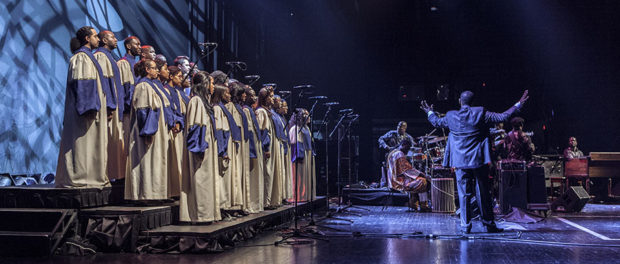Saturday Night at the Jazz Fest
Nothing beats wandering the streets of the jazz fest, absorbing the sights and especially the sounds, going from stage to stage to discover beats both old and new. Over the course of a couple of hours Saturday night, I managed to hear the Queen of Ragtime, Mimi Blais; West Trainz, a moving (literally) tribute to the songs of the railway; the fresh and sassy Tia Brazda; and, finally, the soul-stirring spirit of the Montreal Jubilation Gospel Choir.
On the Heineken Stage, Mimi Blais, a veritable one-woman ragtime powerhouse, pounded out the syncopated rhythms that gave birth to jazz at the beginning of the 20th century. Within seconds she had everyone bouncing to a medley of Scott Joplin faves. Her renditions of more modern rags were just as catchy. With a little historical commentary thrown in for good measure, Blais enlightened as well as entertained.
I crossed the path of West Trainz while searching for something to eat. Drawn by the bluesy funk emanating from a crowd gathered at the foot of the stairs of Place des Arts, I stopped to listen, admiring the somewhat steampunk setup: Brass speakers and megaphones and metallic lights adorned what turned out to be a mini-train that eventually started to wind its way through the crowds, playing reggae, funk, and blues-inflected tunes that transported us aurally like a jazzy Orient Express.
West Trainz eventually led to the TD stage, where the clear, sparkling voice of Tia Brazda, backed by her great band, captivated with a mix of old and new, mellow and upbeat, a modern twist on a classic sound.
My evening ended at La Maison Symphonique, where the Montreal Jubilation Gospel Choir—an established institution in this city since 1982—roused concert-goers with their soulful renditions of gospel songs both old and new. The concert started with a sax solo—an impassioned reverie on Amazing Grace that filled the hall with its heart-wrenching pleas. The saxophonist was joined by the musicians—winds and brass, guitar and bass, drums, piano, and the obligatory Hammond organ. And then, finally, the singers filed in from the back of the hall, dancing down the outside aisles, clapping and singing and making eye contact with the audience, and the concert really began.
Studies have shown that singing in a choir has many benefits, including beating depression. I would guess that singing in the MJGC is not just anti-depressive; it’s probably more like being on ecstasy. The sheer, soulful joy transports and transcends, and not just the singers but the audience as well. From Highway to Heaven to Ezekiel Saw the Wheel, from the group numbers to the soloists, the MJGC is a positive force to be reckoned with.






